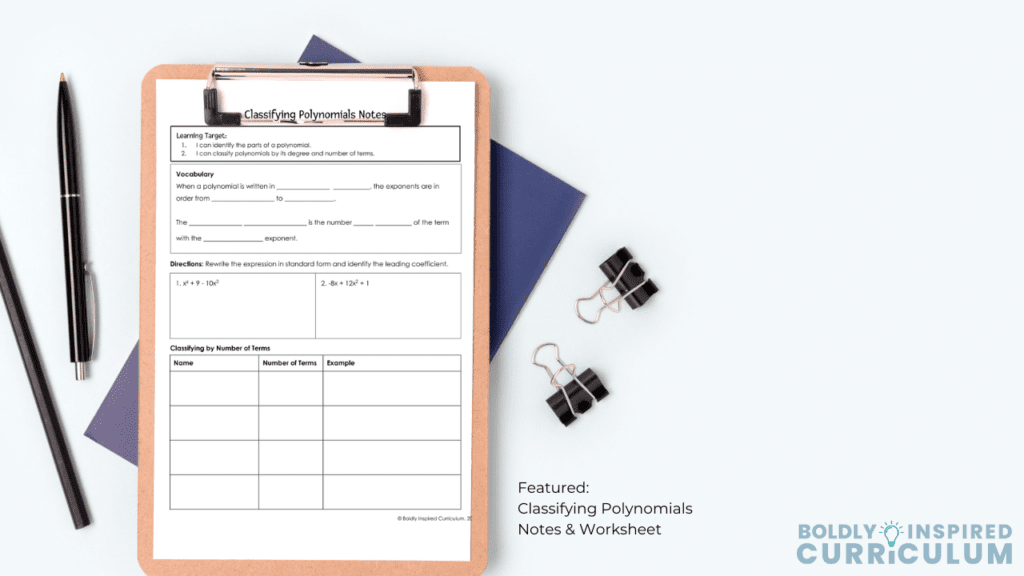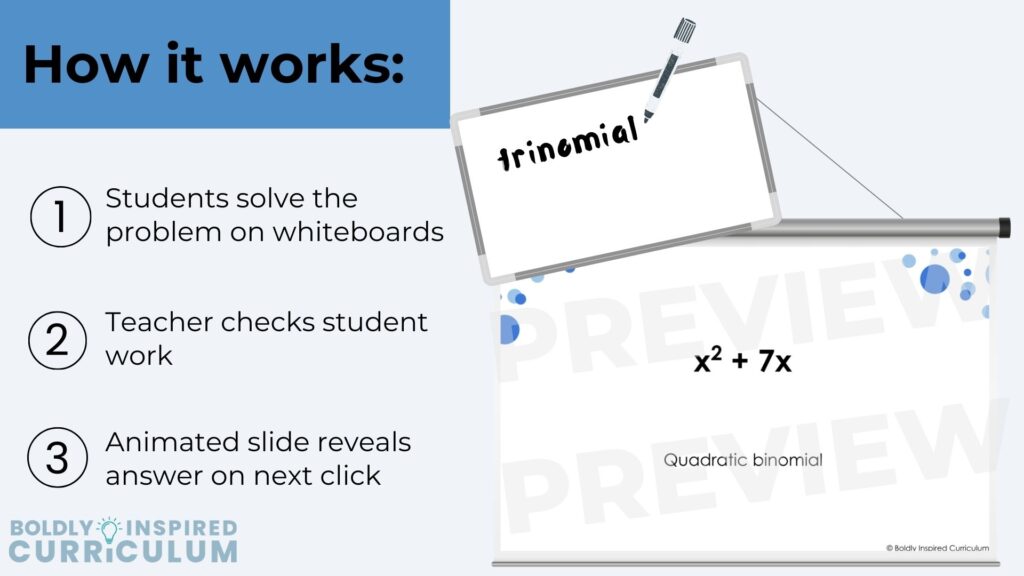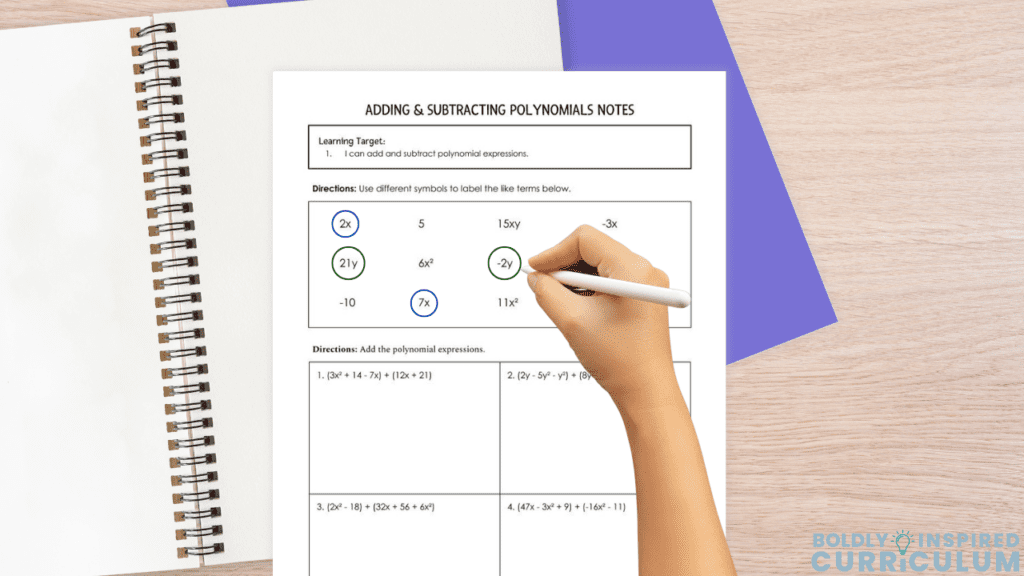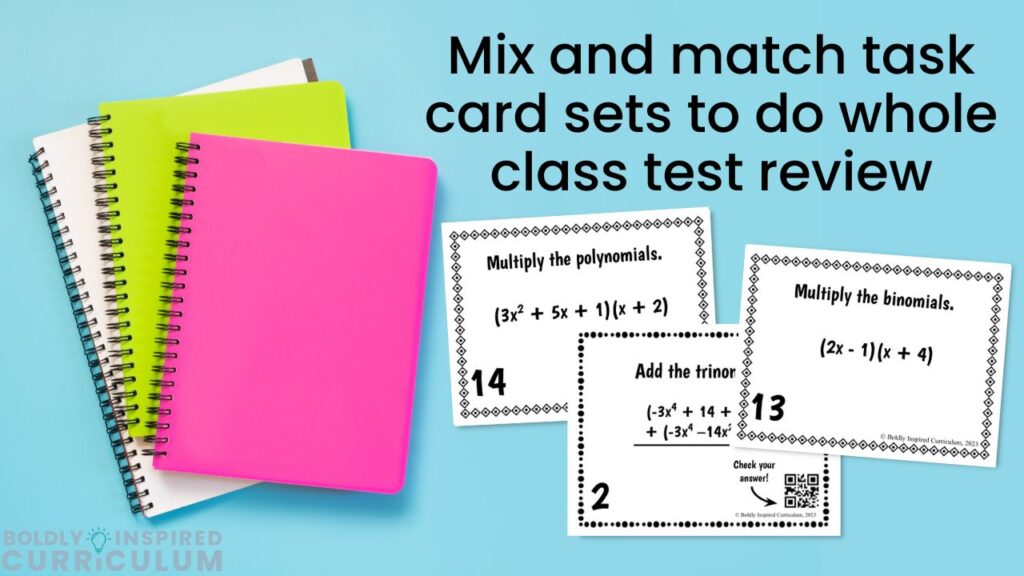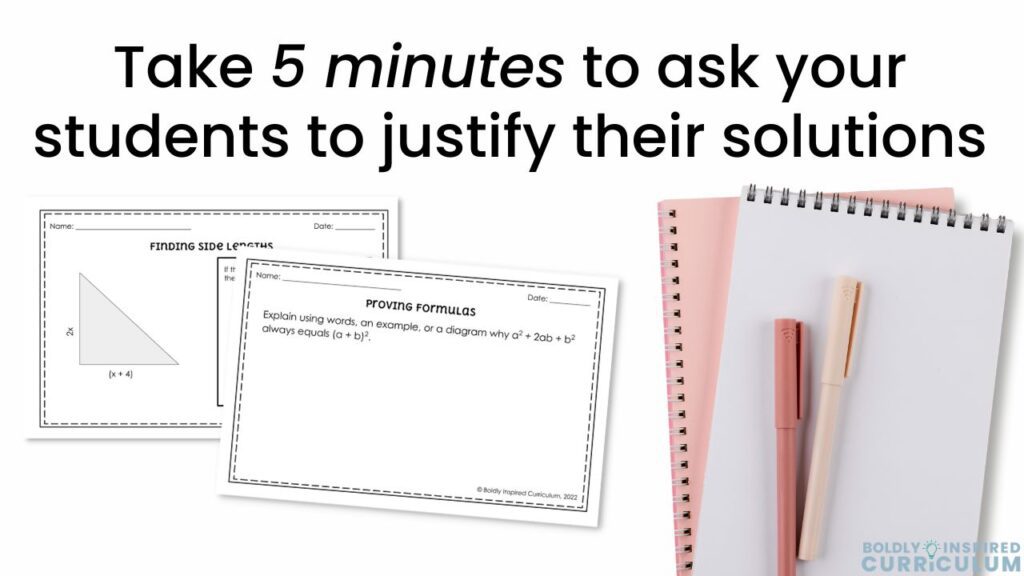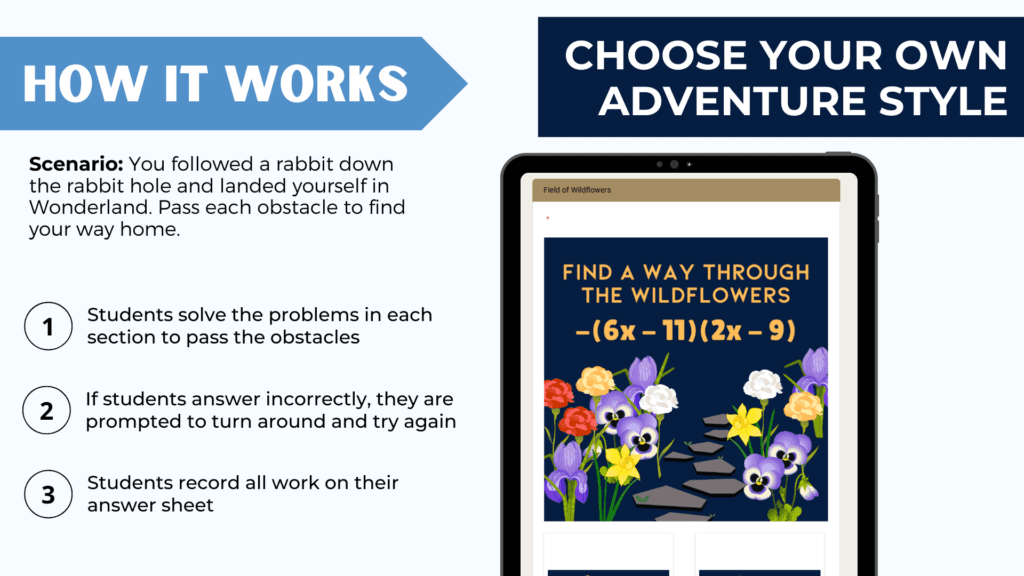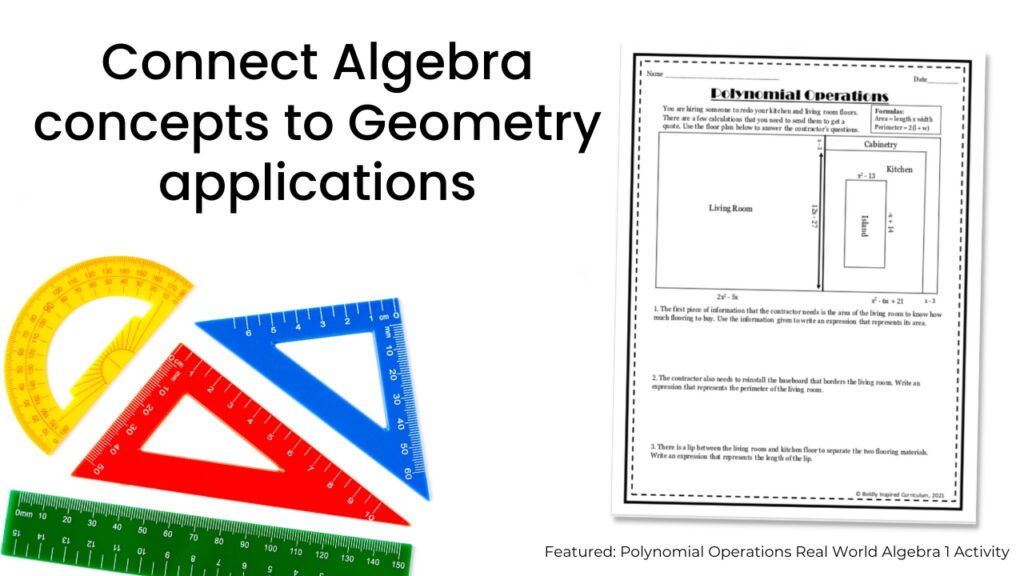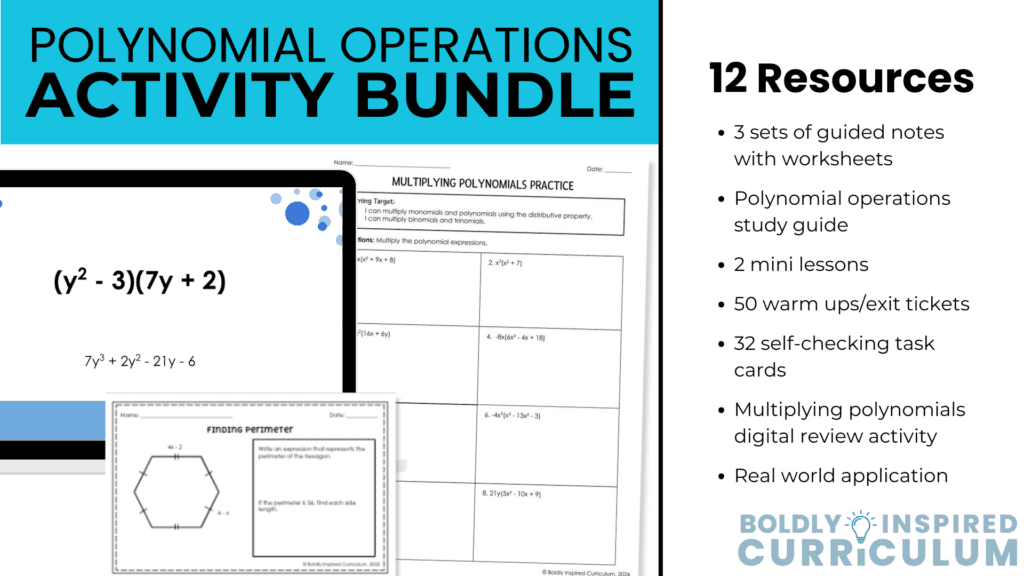I always tell my students that if there’s anything I want them to remember from Algebra 1 when they get to Algebra 2 it’s polynomial operations and factoring.
Polynomials are truly the foundation of algebra and understanding how to manipulate the expressions should feel as effortless to Algebra 1 students as solving multi-step equations.
They are a stepping stone to polynomial functions and factoring that gets students familiar with functions that are more advanced than just linear equations.
It’s so important for math teachers to take the time to make sure that their students have a solid understanding of polynomial operations. This means lots of practice and different types of activities to keep student engaged.
Table of Contents
ToggleClassifying Polynomials
Teaching vocabulary, terms, and degrees
Algebra 1 doesn’t have much vocabulary that students need to remember and distinguish between. It’s typically pretty straightforward.
However, explicitly teaching ways that polynomials are classified will help your students become more comfortable talking and writing about math. The ability to understand and recognize polynomial vocabulary will also help your students increase their math fluency.
This classifying polynomials lesson plan presents vocabulary in a fill in the blank format as well as tables that can be used as reference sheets throughout the entire unit.
These guided notes also include critical thinking questions that are perfect for whole or small group discussions of problem solving strategies.
Whiteboard activity
Increase student engagement with this no-prep classifying polynomials activity using individual whiteboards!
This is my go-to activity when my original lesson plan doesn’t work out or my students need extra practice before moving on to the next skill.
How this lesson plan works:
- Review polynomials vocabulary (if necessary).
- Present each question on the board. Your students will solve the problem, then lift their whiteboard for immediate feedback.
- Float around the room to check in with students and quickly see what they do and don’t understand.
- Animated slides reveal each answer before moving on to the next question.
Adding & Subtracting Polynomials
Guided Notes
Adding polynomials is a great place to start when teaching polynomial operations. Your students should be comfortable combining like terms.
After a little practice with classifying and a quick review of like terms, they should be ready to move on to subtracting!
These guided notes show two different ways to teach subtracting polynomials. They can choose from split and distribute (horizontal) or stack and subtract (vertical). I always like to give my students a choice of how they want to solve the problems.
The included practice worksheet can be used for classwork, homework, or quiz review.
Task Cards
There are so many ways that you can use task cards in your math classroom. These are a great substitute or supplement to a study guide for an upcoming test.
Since these adding and subtracting polynomials task cards are self-checking, your students can work independently or in pairs to complete these with little to no help from you.
You will finally be able to walk around the room and observe while your students problem-solve and discuss strategies.
Warm Ups & Exit Tickets
Unlike standard Algebra 1 bell ringers and exit tickets that only include additional practice problems, these writing prompts require your students to think critically and justify their reasoning.
You can think of these math warm ups as content-based, standards-aligned reflection questions. This set of critical thinking prompts includes 20 questions for adding, subtracting, and simplifying polynomial expressions.
Can I use writing prompts for more than just warm ups and exit tickets?
Absolutely! Here are a few ways that I have used writing prompts in my math classroom.
- Gallery walk – Hang writing prompts around the room and have small groups work to solve the answers. Rotate the students and have the next group add to the previous group’s work with a different strategy, idea, etc.
- Test review – Mix and match the writing prompts to assess your students’ understanding of the material before test day.
- Roundtable discussions – Have your students discuss different strategies to solve an application problem.
Multiplying Polynomials
Guided Notes
This set of guided notes and practice worksheets includes two versions so that you can easily differentiate your Algebra 1 class. Whether you (or your students) prefer the box method or distribution, these guided notes have you covered!
These notes have example problems for binomial x binomial, binomial x trinomial, and trinomial x trinomial. You can complete this lesson in one full class period or split it up to have your students practice the different types of problems on separate days.
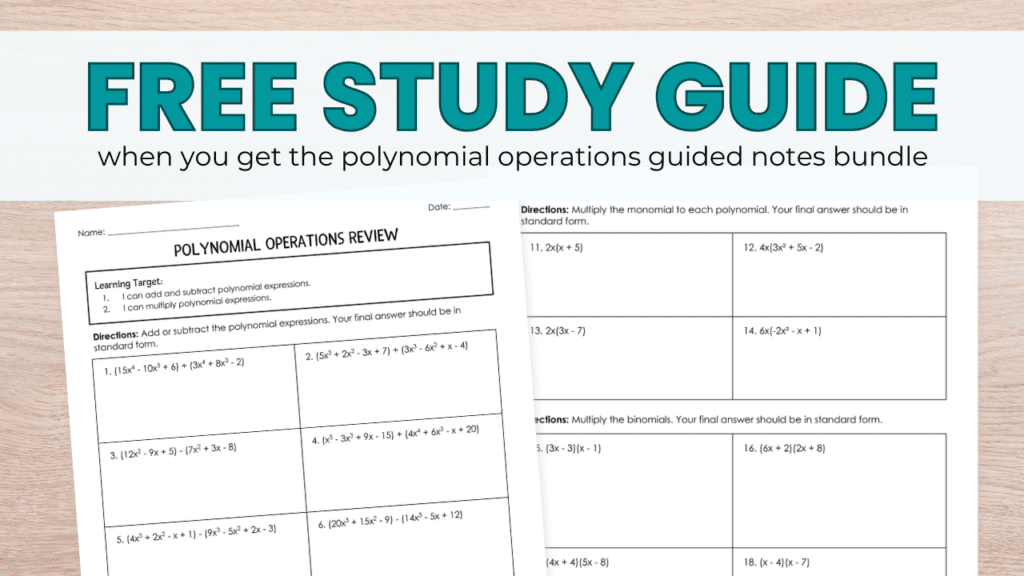
Task Cards
Get your students out of their seats with these self-checking multiplying polynomials task cards! You can use this low-prep resource for Algebra I practice or Algebra II review.
This activity includes 16 problems that require the students to simplify polynomial expressions by multiplying monomials, binomials, and trinomials.
Warm Ups & Exit Tickets
This set of multiplying polynomials warm ups and exit tickets is the perfect no-prep, grab-and-go activity to supplement your current Algebra 1 curriculum.
All of the writing prompts are content-aligned and can be used as Algebra 1 exit tickets, math journal prompts, or task cards.
What kind of questions are included?
- Critical thinking and reflective journal prompts
- Error analysis and critiquing
- Real-world math problems
- Compare and contrast
- Think, pair, share
- Which doesn’t belong?
Warm Ups & Exit Tickets
In this choose-your-own-adventure style activity, your students will solve a variety of multiplying polynomials problems on their journey home from Wonderland.
This self-checking Google Form activity has seven questions with a mix of multiple choice and short answers.
Real World Applications
Forget the stress of finding ways to differentiate in your Algebra 1 classroom! This real world math activity for polynomial operations has two versions that will challenge and engage all of your students.
Level 1 gives formulas and scaffolds the word problems, while Level 2 requires your students to think critically and problem solve.
What is the real world scenario?
You are hiring someone to redo your kitchen and living room floors. There are a few calculations you need to send to them to get a quote. Use the floor plan below to answer the contractor’s questions. From this scenario, your students will write expressions using the information given in the diagram and explain their thinking.
This real world algebra application is perfect for group work and collaboration. It can also be used as a stand-alone formative assessment for polynomial operations!

